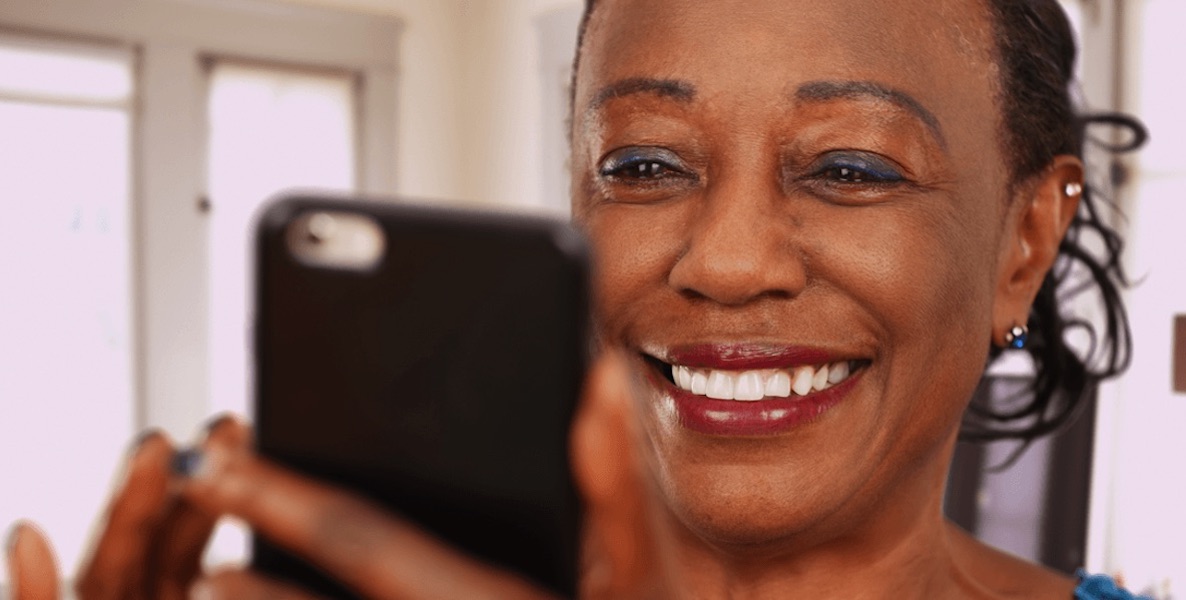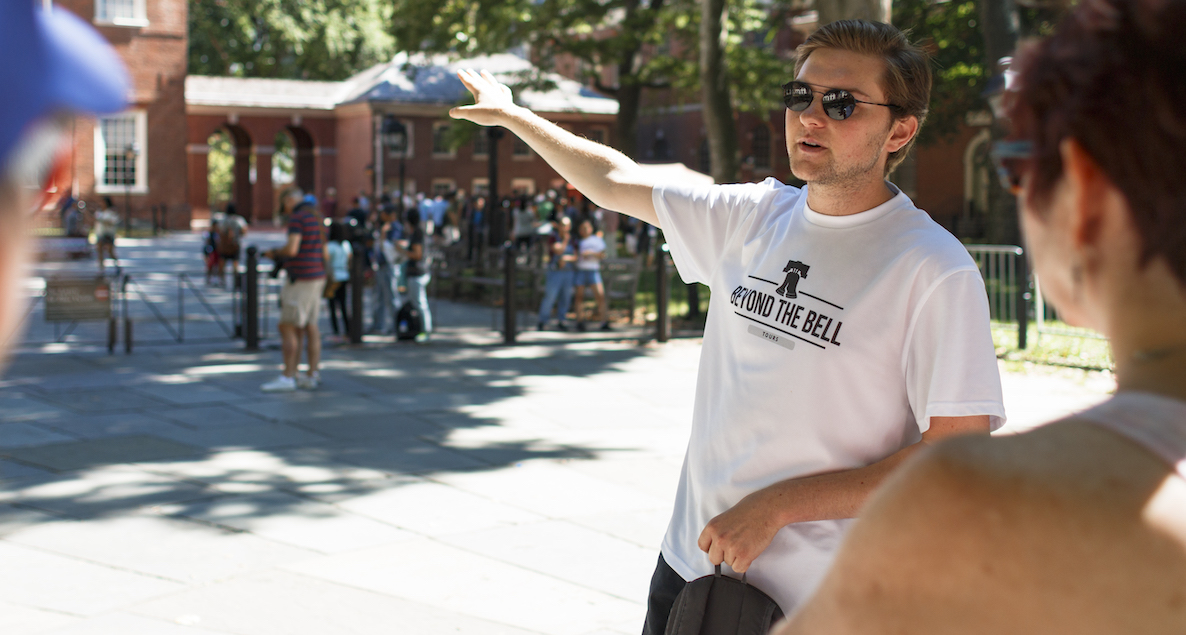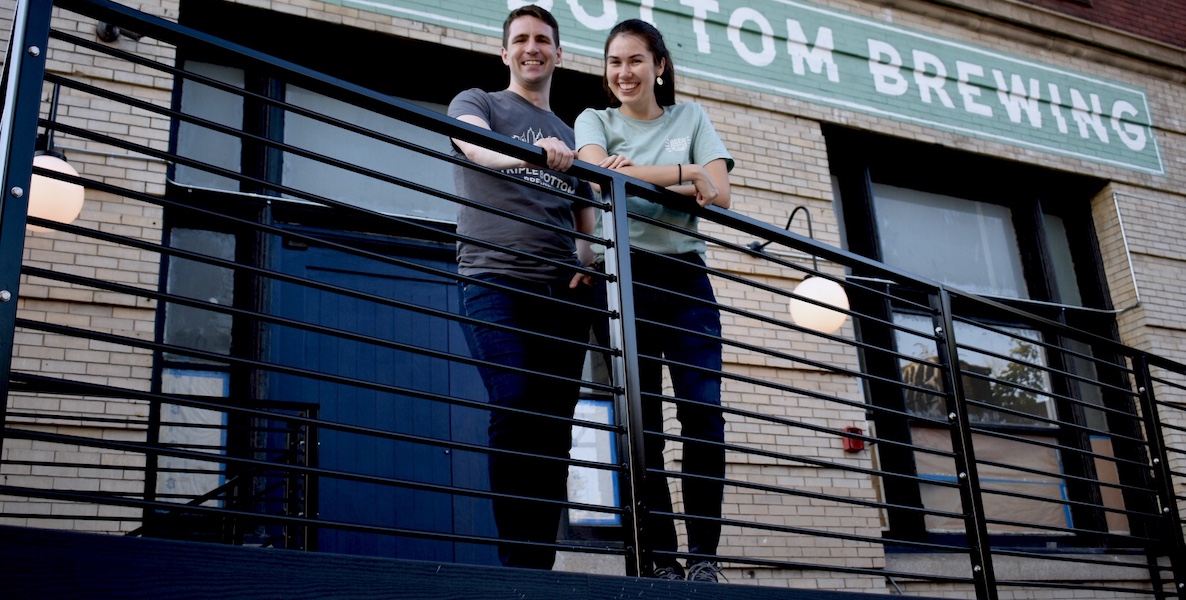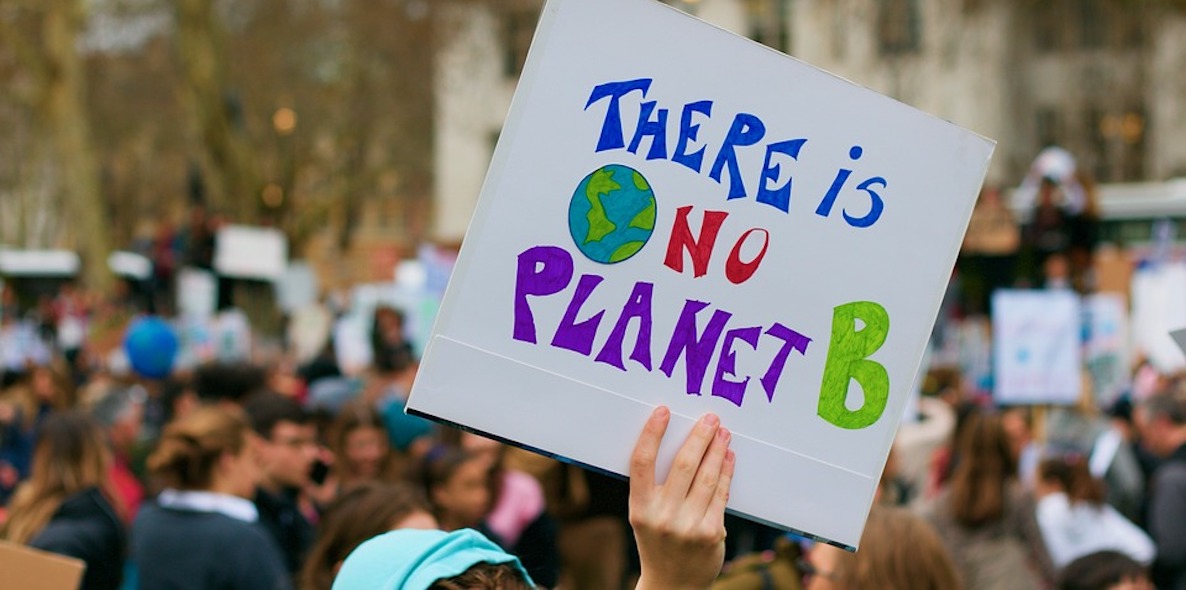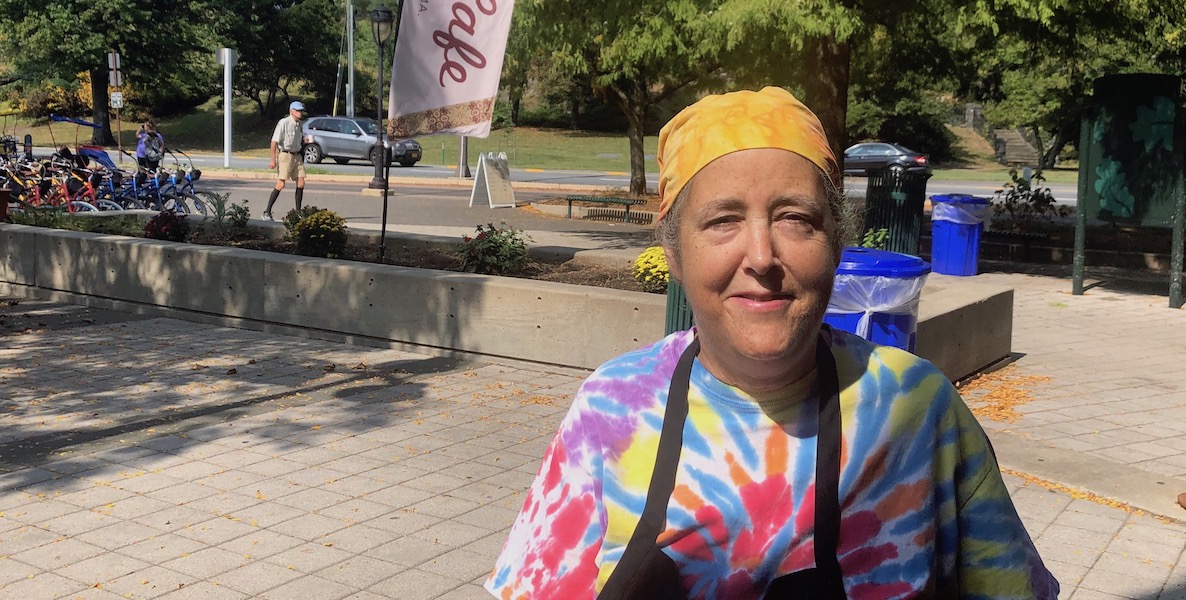When Tyheed Roane started working at Cosmic Cafe—the casual stop on Boathouse Row—five years ago, he was a dishwasher. After about a year, he took on other responsibilities at the café, refilling napkins, serving food and bussing the metal tables on the patio outside.
“I learned through observation,” he says matter of factly, standing next to the cafe’s well-stocked fridge. Now, he runs the register and prepares the fresh-pressed juices the place is known for.
Roane, 27, has autism, which he describes as: “Hesitancy, anxiety, always trying to gather your thoughts and feelings to put into words, and awkwardness meeting new people and around family and friends.”
Last year, he graduated with a BA in Liberal Arts from Philadelphia Community College; his job at Cosmic Cafe has helped him support his grandmother and uncle, whom he lives with.
A few things Roane has learned on the job: “Patience, perception, tolerance, learning how to see other people’s points of view,” he says. Biggest challenges? Dealing with difficult customers. And also, “Trying to be there for my co-workers, especially my boss.”
It has also been important for his personal growth. A few things Roane has learned on the job: “Patience, perception, tolerance, learning how to see other people’s points of view,” he says.
Biggest challenges? Dealing with difficult customers. And also, “Trying to be there for my co-workers, especially my boss.”
His boss is chef Peg Botto, who opened Cosmic Cafe in 2011 to not only serve delicious food along the Schuylkill, but also to provide a welcoming and inclusive place to work. People with disabilities, including autism and cerebral palsy, make up two thirds of her staff, some who have worked with her since she opened.
She explains her motivation pretty simply: “Many [people with disabilities] are at home, bored and that’s not healthy,” she says. “And employers need employees!”
Yes, she says, it often requires more patience to work with folks who have disabilities, and you don’t always know what the challenges will be up front. “But you don’t know what you’re going to get with any employee!” she says. She does know that the folks with disabilities she’s hired want to work 100 percent—they’re willing to learn, they never show up late or call out sick, and they rarely quit, she says.
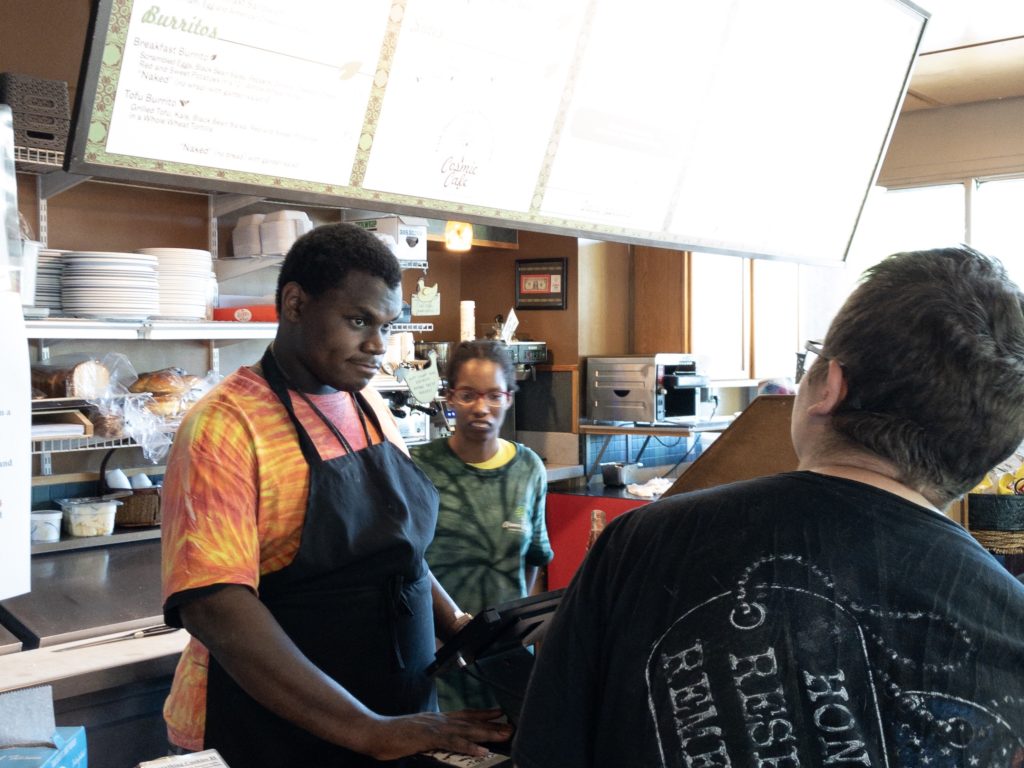
Botto makes it look easy; her entire staff helps train the new folks, many like Roane, who just show up and ask for a job. And her background gives her a leg up for the extra patience and understanding she says is needed when employing folks with disabilities. After studying special education in college, Botto found a job in social services; she helped run group homes in Ambler and Northeast Philadelphia.
“They had just closed Pennhurst,” Botto remembers. The state asylum in Chester County was known for appalling abuse, over-medication and poor conditions for “residents,” which was captured in investigative reporter Bill Baldini’s expose on NBC10 in 1968. (You might also recognize the name from billboards advertising the PennHurst Haunted Asylum attraction that exploit the deeply horrific and sensitive experiences of former patients for money-making “entertainment.” (Read this op-ed for insight into just how backward the “attraction” is.)
![]() When it finally closed in 1987, there were a lot of vulnerable people with no place to go. “They gave us names and we’d go out in a van and bring them back to apartments,” Botto says.
When it finally closed in 1987, there were a lot of vulnerable people with no place to go. “They gave us names and we’d go out in a van and bring them back to apartments,” Botto says.
Around that time, a collective awareness activists had long been pushing for started to sink in: Grouping people with disabilities together, isolated from community life isn’t good for them or for our communities. State institutions across the country were closing and, in 1990, Congress passed the Americans with Disabilities Act (ADA) to prevent discrimination against people with disabilities in accessing education, transportation, public places, government services and employment.
People like Botto were helping to facilitate the transition of folks out of institutions and into communities. It’s hard for her to talk about parts of the experience; she remembers many people were self-abusive. And that’s when she noticed how so many were bored: “A lot of them were at home all day, or doing jobs like stuffing something into a bag over and over.”
She started connecting folks with jobs in the community, at places like 7-Eleven and Chili’s.
Eventually, she got burned out on time-consuming paperwork required for the job; she went to culinary school and opened Cosmic Cafe so she could hire folks herself. Botto now employs 10 people who have a range of disabilities, which is desperately needed from more employers here in Philadelphia.
These folks know that a job can provide a purpose, social interaction, satisfaction, and self-sufficiency for anyone, including folks with disabilities.
According to the U.S. Census Bureau 2012-2016 American Community survey, Philly has among the highest population of disabled people of the largest 10 cities—16 percent, which is two percent more than the next closest city (San Antonio) and about six percent higher than the other eight cities listed. There are hearing, vision, cognitive and ambulatory disabilities, and Philly ranks highest by the widest margin in the latter two.
Philly’s ranking is in part explained by our high rates of deep poverty (measured by the number of citizens live 50 percent below the poverty line), which is strongly correlated to poor mental, emotional, and physical health. And though many people with disabilities are able to work, according to the U.S. Bureau of Labor Statistics, just 30 percent between the ages of 16 and 64 are employed, which furthers the cycle of poverty.
Many Philly organizations and employers are trying to do something about those stats. Two businesses dedicated to providing social inclusion and work for folks with disabilities opened in the suburbs in the last year: Something Different by Eric in Bryn Mawr and GET Café (named after the owner’s non-profit, Great Expectations Together) in Narberth. And hundreds of employers around the city, like Botto, work with non-profits like SPIN and Community Integrated Services (CIS) that help people with disabilities find meaningful work. ![]()
These folks know that a job can provide a purpose, social interaction, satisfaction, and self-sufficiency for anyone, including folks with disabilities. And they know we need to do a better job of ensuring that people with disabilities are proudly visible in our communities and respected for their contributions.
On-the-ground organizations like CIS, that help people with disabilities find meaningful work and give them support for job retention, independence at work and career advancement, are making an especially big impact. CIS works with more than 500 employers in the region and last year, they provided services for 1,350 people with disabilities in the Philadelphia area.
Like Carlota Boker, who works at Cosmic Cafe, sweeping and bottling juice. Some parts of the job are still a challenge for her, like folding napkins, she says. “They’re a little hard, but I’m getting the hang of it.”
Boker has cerebral palsy, which can affect movement and muscle tone. CIS provides a job coach who works with her each shift and helps her with more difficult tasks. Boker plans to stay at Cosmic Cafe and hopes to eventually learn how to work the register.
Yes, Botto says, it often requires more patience to work with folks who have disabilities, and you don’t always know what the challenges will be up front. “But you don’t know what you’re going to get with any employee!” she says.
Part of CIS’s mission is to facilitate the career advancement of the folks they work with through individualized on-the-job support and training. “We believe everyone is ready to work,” says CIS Director of Employment Services Melissa Good. “You may not have a skill set for a job that you’re interested in, but our goal is to get you a foot in the door in order to gain a skill set so that you can be successful in that position.”
Their work is especially important now as, since July, the PA Office of Vocational Rehabilitation (OVR), which helps people with disabilities prepare for, obtain or maintain employment, has been operating under a closed order of selection, which means they’re not providing services for new individuals. OVR is funded by both the state and federal government, but requests for their services has outpaced their funding resources. Indefinitely, anyone seeking services is put on a waitlist. In order to access funding for services through another organization, they need to get a waiver from OVR, for which there is also a waitlist. Which means many people with disabilities are going without the support they need.
CIS has a unique model; they don’t offer any group or sheltered programs, only individualized,community-based services to better meet the specific needs of each individual. “Everybody has unique skills and interests, and jobs should be based on individual strengths, preferences, and needs,” says CIS Development Associate, Zach Catarelli.
With the help of CIS, former England resident and lover of London tea shops Schuler Jenkins-Young found a job at the Random Tea Room; owner Becky Goldschmidt hired him to help with cleaning tasks. “He has a list that he goes through and has a guide here to help him remember the details,” Goldschmidt says. “Since he’s been here he’s done such a good job we gave him a raise.”
![]() It’s not always a perfect fit; the first employee CIS connected Goldschmidt with didn’t work out. The Random Tea Room has a hushed vibe and the small space is decorated with fragile art, pottery, and tea accessories; not the right place for someone who might talk too loudly or who tends to bump into things.
It’s not always a perfect fit; the first employee CIS connected Goldschmidt with didn’t work out. The Random Tea Room has a hushed vibe and the small space is decorated with fragile art, pottery, and tea accessories; not the right place for someone who might talk too loudly or who tends to bump into things.
In a case where an employee isn’t working out, CIS sets up a meeting between the employee and their staff support and the employer to figure out how to move forward. “As we are also a service to businesses, a CIS Business Development Specialist will follow up with the employer to discuss how we can continue to serve as a resource to them,” Catarelli wrote to me in an email. “This typically includes a discussion on why the job did not work out, clarifying expectations, and providing a new applicant better suited to their needs.”
Of course, not every Philadelphian with a disability is able to work, and there are other ways we can make sure those folks are also included and valued members of our city.
Vicki Landers of Disability Pride Philadelphia Inc. is among the activists who petitioned Governor Wolf to designate October in Pennsylvania as Disability Action Month. Nationally, October Disability Employment Awareness Month, but as Landers points out, that cuts out those who can’t work. “With Disability Action Month, we’re asking people to talk about all things disability, not just employment,” Landers says. “It’s also pride, our history, education, accessibility and inclusion.”
Landers hopes we can all further educate ourselves on disability etiquette, make sure public events are accessible, and call on the city to make sure new buildings are designed (and existing public spaces are modified) as welcoming to all.
It’s another important step towards making Philly the inclusive city we want to be.
Related stories
- First Step Staffing connects homeless people with jobs in Philadelphia
- This 8th grader with visual impairments is already more politically active than you
- Philly comedian volunteers to take people to the polls in her accessible van
- FringeArts play spotlights the intellectual disabilities rights movement



